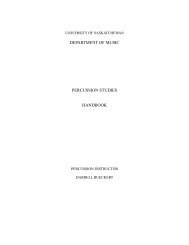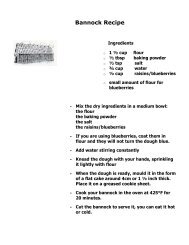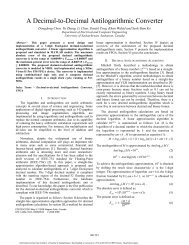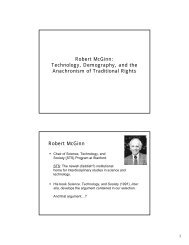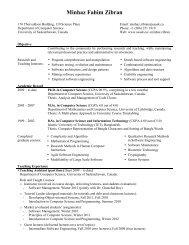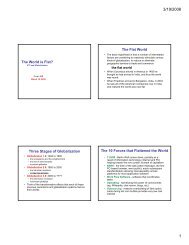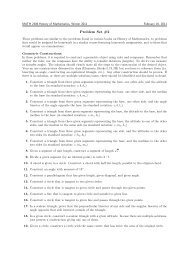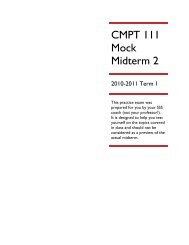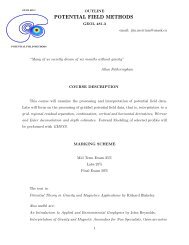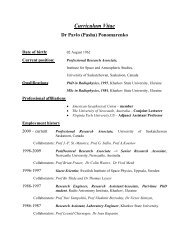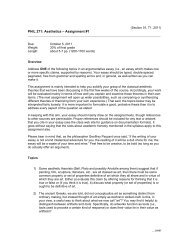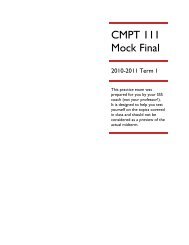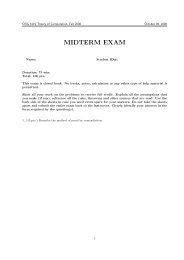Water Resources Engineering - Homepage Usask
Water Resources Engineering - Homepage Usask
Water Resources Engineering - Homepage Usask
Create successful ePaper yourself
Turn your PDF publications into a flip-book with our unique Google optimized e-Paper software.
C7. GROUNDWATER HYDROLOGY<br />
(KUL-code: I748 (Th); I749 (Pr))<br />
Lecturer: DE SMEDT F.<br />
ECTS-credit: 5 pts<br />
Contact hours: 30 hrs. of theory/30 hrs. of practical<br />
Prerequisites: Hydraulics, Hydrology and Geology contents<br />
Time and place: 2nd semester, 13 sessions of 3 hours each, K.U.Leuven<br />
Course syllabus: Course notes are available<br />
Evaluation: The exam is open book. The students are tested on their insight in fundamental<br />
understanding of the material and their ability to interpret and process information<br />
concerning groundwater occurrence and dynamics. The overall result is obtained as 2/3<br />
on the exam and 1/3 of marks given on the exercises.<br />
Comparable handbook: Freeze, R.A., and G.A. Cherry, 1979. Groundwater. Prentice Hall, Inc., 604 p.<br />
Additional information: -<br />
Learning objectives:<br />
The goal of this course is to give the student a fundamental understanding of the principles and practical<br />
applications of groundwater occurrence and behavior, such that the student can interpret observations in a<br />
correct way, calculate and predict groundwater amounts and movement, and in general be able to manage<br />
groundwater in a sustainable way.<br />
Course description:<br />
1. Fundamentals: groundwater and the hydrologic cycle; occurrence of underground water; basic properties as<br />
porosity, water content, groundwater potential, flux and velocity; Darcy's law; measurement techniques for<br />
groundwater potential and conductivity;<br />
2. Natural groundwater flow: hydrogeological classification of ground layers; aquifer types; groundwater flow<br />
systems; unsaturated zone; saturated groundwater flow and storage in artesian and phreatic aquifers and in<br />
aquitards; the hydraulic groundwater flow approach and the flow net theory;<br />
3. Groundwater abstraction techniques: advantages of groundwater use; wells and galleries; principles of well<br />
flow as cone of depression, radius of influence, maximum and specific capacity; interference between wells<br />
and aquifer boundaries; pumping test analysis; design of well fields; safe yield and groundwater<br />
management;<br />
4. Groundwater chemistry: groundwater chemical constituents and main processes; oxygen status and organic<br />
matter decay in unsaturated and saturated groundwater layers; mineral dissolution and ion evolution cycle;<br />
groundwater isotopes; groundwater pollution sources and major pollutants; measurement techniques and<br />
interpretation and classification of water types; groundwater quality assessment and protection techniques;<br />
Practical exercises:<br />
- Analyses of field samples: determination of porosity, water content, density and hydraulic conductivity;<br />
- Field measurement techniques: interpretation of slug tests in auger holes and piezometers;<br />
- Calculations of groundwater flow in artesian and phreatic aquifers using piezometric readings;<br />
- Flow net analyses using piezometric data and field reconnaissance for hydrogeological mapping and<br />
interpretation;<br />
- Analyses and interpretation of drawdown around pumping wells and pumping test experiments;<br />
- Design of groundwater pumping wells and well fields; and<br />
- Interpretation of hydro-geochemical data: Stiff and Piper diagrams, classification of water types and<br />
identification of chemical evolution.<br />
Complementary studies in <strong>Water</strong> <strong>Resources</strong> <strong>Engineering</strong> / 12



